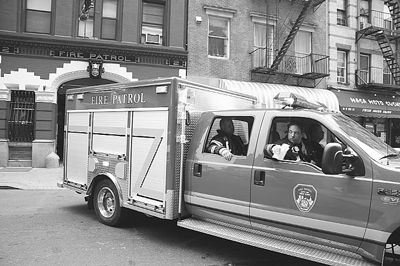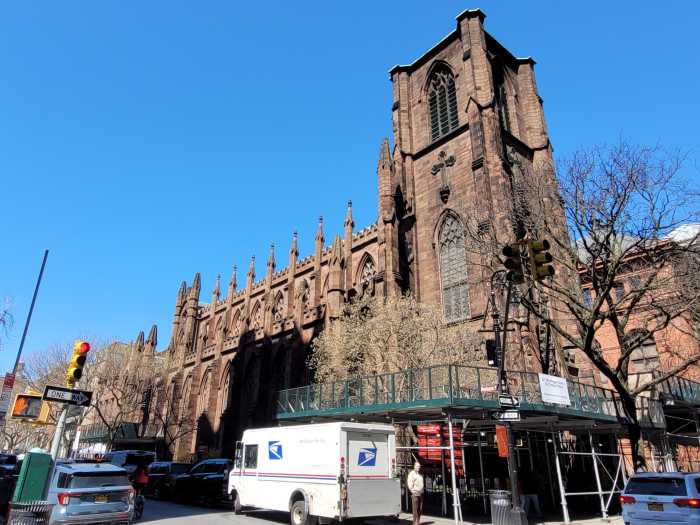By David Spett
Firefighting is in Eric Schultz’s blood.
Schultz, 51, who lives in Southampton, N.Y., became a Village fire patrolman in 1992, following in the footsteps of his great-grandfather, also a fire patrolman, and his great-great-grandfather, a New York City volunteer firefighter before the Civil War.
Soon, Schultz may no longer be able to keep following in his ancestors’ footsteps.
The Fire Patrol, a 200-year-old organization that works alongside the New York City Fire Department and protects property on behalf of insurance companies, is slated to be dissolved on Oct. 1, but not without protest from Schultz and others.
The patrol’s firehouses, in the Village at 84 W. Third St., in Chelsea at 240 W. 30th St. and a third in Brooklyn, are slated to be closed.
“It’s going to leave a hole in the emergency service response of the city,” said Schultz, who is vice president of the patrolmen’s union. “Anybody you talk to, they all say, ‘Why would they want to shut you guys down? It doesn’t make sense.’ ”
Schultz also expressed concern that 96 fire patrolmen will lose their jobs.
Though the Fire Patrol is unaffiliated with the Fire Department and is funded by insurance companies, fire patrolmen work with city firefighters and the two groups have the same union, Schultz said. One patrolman, Keith Roma, died on Sept. 11, 2001, while directing people out of the World Trade Center.
Many patrolmen eventually join the Fire Department. Explaining the difference between the two organizations, Schultz said, “They put out the fire, we put out the water. We assist them if they need it, and they assist us if we need it.”
The Fire Patrol’s duties go beyond cleaning up floods and water leaks, Schultz said, and include rescuing people from elevators, emergency generator service and saving lives.
The patrol picks up most of the same radio calls as the Fire Department, Schultz said, and responds to the most serious issues in the city.
“We self-dispatch, and the Fire Department also calls the battalion chiefs if they feel that our services are necessary,” Schultz said.
The patrolmen cannot understand why they are being dissolved, he said, given how much money they save insurance companies.
“Every insurance executive knows that if you stop the water [from dripping onto] the floors below, it’s going to save them money,” Schultz said.
The patrol’s parent company, the New York Board of Fire Underwriters, stands to save $8.5 million annually by dissolving the Fire Patrol, according to Schultz.
New York is the last city in the country with a Fire Patrol, Schultz said. It was also the first city to have a patrol. At its peak, there were 10 units in the city. Chicago, the last city with a Fire Patrol, dissolved its organization in 1959.
To Schultz, the Fire Patrol is still necessary in New York because of the city’s concentrated wealth.
“We can get to a building fast,” he said, adding that time and money will be wasted if the Fire Department has to take over the Fire Patrol’s work.
Schultz and other patrolmen hope the City Council will integrate the Fire Patrol into the Fire Department, or will force insurance companies to fund them.
The patrolmen have started a petition, both online and on paper, to keep the Fire Patrol open. So far, 577 people have signed online.
As for the future, Schultz said he is too old for any other fire department to hire him.
“I’m not able to retire, either, because I don’t have the same pension plan as the F.D.N.Y.,” he said. “I’m putting all my efforts into continuing this job. That’s my prime focus right now.”
Two messages left for Greg Serio, acting president of the New York Board of Fire Underwriters, were not returned by press time. A Fire Department spokesperson declined to comment.































